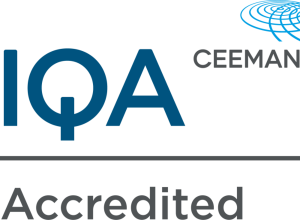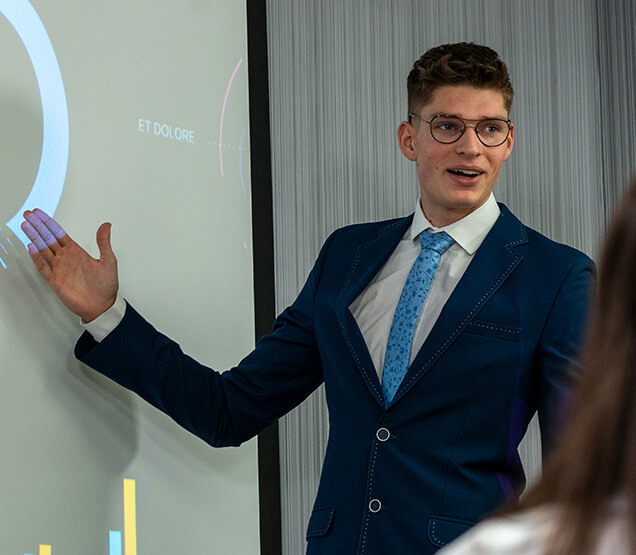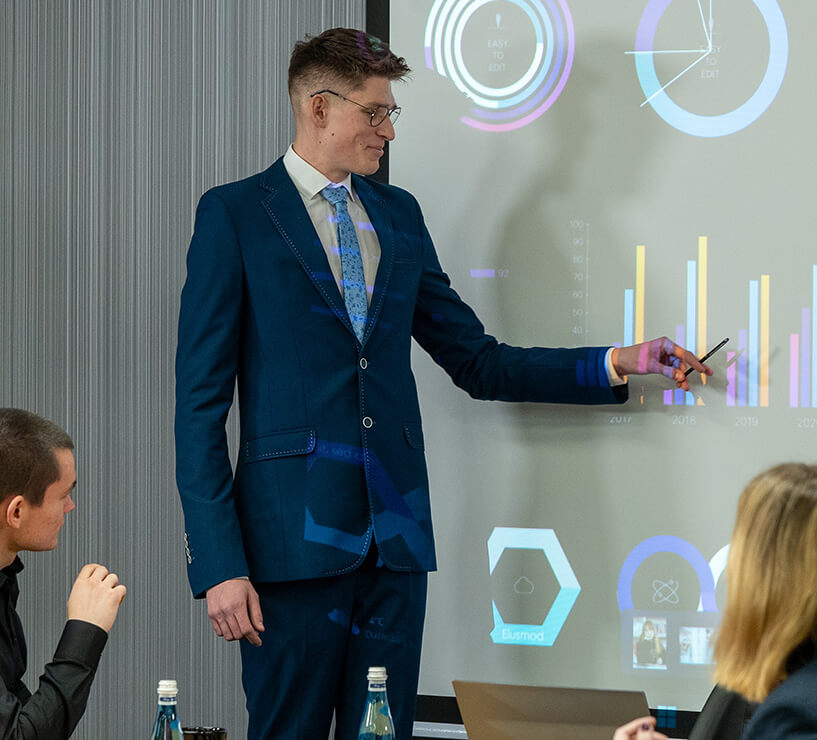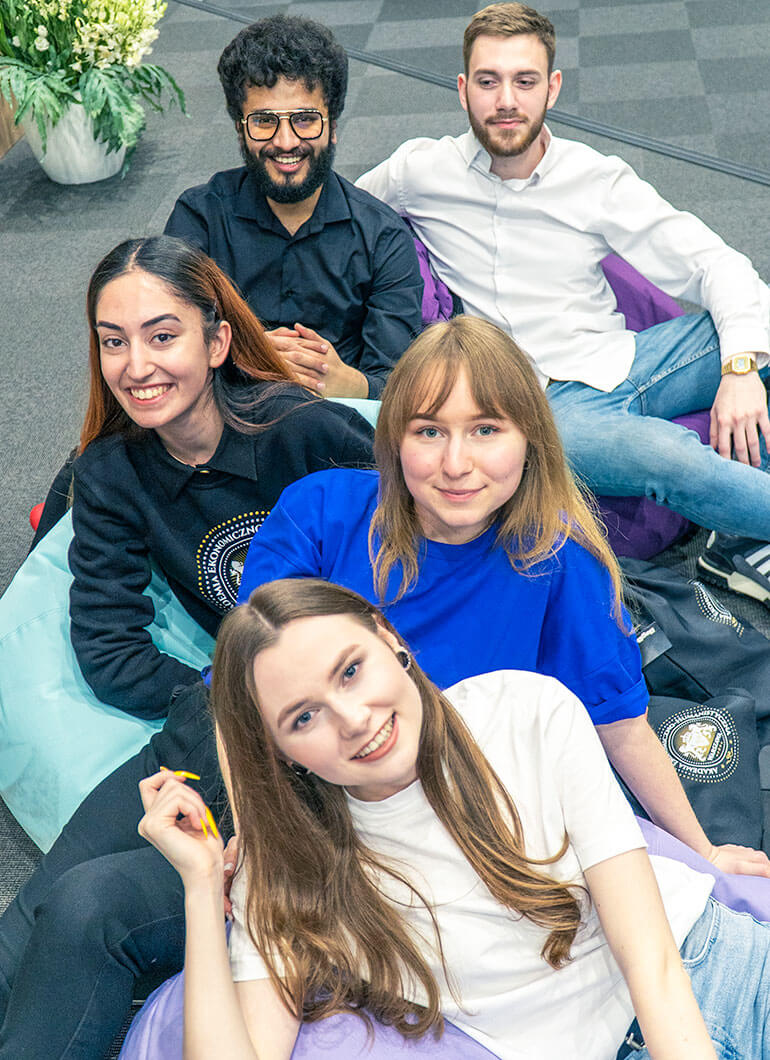Economics Economics - Recruitment finished
Undergraduate (Bachelor)
Economics
Why choose this field of study?

In the era of increasing globalization and continuous development of the economy, completing a degree in economics will provide you with reliable and comprehensive career prospects. Are you passionate about national and local market mechanisms? Are you interested in finance, statistics, industrial or business economics? After completing the undergraduate studies in Economics at the VIZJA University, you will know how to reason like an economist and how to professionally analyze and manage processes in this area. You will learn to perform qualitative and quantitative analyses, solve complex economic problems, make economic decisions, and predict their consequences. You will be provided with extensive theoretical knowledge and practical tools that you will undoubtedly use in your future career.
When studying at VIZJA University, you will explore general economics – including microeconomics, which deals with the functioning of individual elements of the economy (the components of the economic system), and macroeconomics, that is, studies of economic processes as a whole. You will also learn the basics of related social sciences, such as economic law, sociology, and socioeconomic geography. Importantly, you will develop a set of indispensable skills including mathematical analysis, statistics, econometrics, database management, or IT tools use. In your final year of study, you will be able to choose a specialization: Applied Economics or Quantitative Methods in Economics, which you can later continue as part of graduate studies (see Applied Economics graduate studies or Quantitative Methods in Economics graduate studies).
Economics (undergraduate) - what sets us apart?
- Our focus lies on providing you with a modern economist’s skillset that will benefit you in your future career.
- You will learn the basics of programming, business informatics, or experimental economics.
- Instead of the laborious process of writing an undergraduate thesis, you will carry out an interesting social project in the field of economics.
- You will also become familiar with the project method – a key skill for your future profession.
- You will gain knowledge from experts in the field of economics and related sciences.
- Studying at VIZJA University means engaging in an international environment. (VIZJA University was recognized as the most internationalized university in Poland by the Perspektywy University Ranking).
Economics – what can you do after graduation?

After completing the undergraduate program in Economics at the VIZJA University, you will have the knowledge and skills to apply to the positions offered by:
- companies and corporations involved in domestic and foreign trade, as well as financial, controlling or marketing departments in enterprises of all types and sizes;
- banks and financial institutions; companies involved in leasing, auditing, consulting, and accounting;
- centers and institutions engaged in economic risk assessment, economic forecasting, market analysis or public sector economics.
Studying economics at VIZJA University will enable you to develop a career in a variety of positions, ranging from specialist to managerial, as well as to run your own business or consulting business (such as economic risk management, investment analysis, or negotiating commercial contracts). How about working in the media as a commentator or economic journalist? This field opens many doors for development – find out yourself!
This program is for you if:



Admission rules and regulations
Note: important information for 2025 candidates
Please read carefully the application procedures in line with the changes introduced by the Polish Ministry of Science and Higher Education in 2025.
Programme and structure of studies
Undergraduate studies
(bachelor’s degree)
The undergraduate program in Economics focuses on providing students with specialized knowledge in economics and related sciences, as well as implementing the practical skills necessary for the future economist. The program also offers unique field-specific courses within two separate specialty modules.
First year of studies
The first year of study consists predominantly of general subjects from the social sciences, which are necessary to understand the detailed knowledge of economics. During lectures and exercises, students also become familiar with the first field-specific issues.
Semester I
| Subject name | Cummulative amount of ECTS points | Cummulative amount of hours (FT/PT) |
|---|---|---|
| Health and Safety | 0 | 8/8 |
| ACADEMIC SKILLS | 2 | 15/8 |
| INTRODUCTION TO PHILOSOPHY / ANTHROPOLOGY (ELECTIVE) | 5 | 30/16 |
| INTRODUCTION TO PSYCHOLOGY / FUNDAMENTALS OF SOCIAL COMMUNICATION | 5 | 30/24 |
| INTRODUCTION TO THE STATE AND LAW STUDIES | 5 | 30/24 |
| BUSINESS HISTORY | 3 | 30/16 |
| FUNDAMENTALS OF ECONOMICS | 5 | 30/24 |
| ORGANIZATION AND MANAGEMENT THEORY | 5 | 30/24 |
| Electives | 4 | 30 |
Semester II
| Subject name | Cummulative amount of ECTS points | Cummulative amount of hours (FT/PT) |
|---|---|---|
| FOREIGN LANGUAGE | 2 | 30/16 |
| SPORTS AND RECREATION | 0 | 30/0 |
| RESEARCH METHODOLOGY IN SOCIAL SCIENCES | 4 | 24/24 |
| FUNDAMENTALS OF SOCIOLOGY | 3 | 30/16 |
| BASICS OF ACCOUNTING | 4 | 30/24 |
| FUNDAMENTALS OF PRIVATE AND PUBLIC FINANCE | 4 | 30/24 |
| MATHEMATICS (I) | 5 | 60/32 |
| DESCRIPTIVE STATISTICS | 4 | 60/32 |
| SHARING ECONOMY / SOCIAL ECONOMY | 4 | 30/16 |
Second year of studies
In the second year of their education, students of undergraduate Economics deepen their specialized knowledge in subsequent field-specific subjects, such as: microeconomics, macroeconomics, and business informatics. They also attend laboratories and discussions, learning the skills of a future specialist in the field of economics.
Semester III
| Subject name | Cummulative amount of ECTS points | Cummulative amount of hours (FT/PT) |
|---|---|---|
| FOREIGN LANGUAGE | 2 | 30/16 |
| SPORTS AND RECREATION | 0 | 30/0 |
| ECONOMIC GEOGRAPHY | 4 | 30/16 |
| BUSINESS INFORMATICS | 4 | 30/16 |
| MATHEMATICS (II) | 5 | 60/32 |
| MICROECONOMICS (I) | 5 | 60/40 |
| MACROECONOMICS (I) | 5 | 60/40 |
| BASICS OF PROGRAMING | 5 | 75/40 |
Semester IV
| Subject name | Cummulative amount of ECTS points | Cummulative amount of hours (FT/PT) |
|---|---|---|
| FOREIGN LANGUAGE | 2 | 30/16 |
| ECONOMIC AND SOCIAL POLICY | 3 | 30/16 |
| MICROECONOMICS (II) | 5 | 60/40 |
| MACROECONOMICS (II) | 5 | 60/40 |
| STATISTICAL METHODS | 4 | 60/40 |
| DATA VISUALIZATION METHODS / BUSINESS INTELLIGENCE TOOLS | 4 | 45/16 |
| HISTORY OF ECONOMICS | 3 | 30/16 |
| ECONOMETRY | 4 | 60/40 |
Third year of study
In the third year, students complete coursework in a specialization module of their choice:
APPLIED ECONOMICS – with an emphasis on the ability to implement economic principles into social, economic and political life;
QUANTITATIVE METHODS IN ECONOMY – with an emphasis on the ability to use research methods and tools to describe and forecast economic phenomena.
GLOBAL ECONOMY – focusing on the ability to understand and implement economic and business practices on a global scale.
This is also the time to prepare a social project, which replaces the obligation to write a traditional diploma thesis.
Semester V
APPLIED ECONOMICS
| Subject name | Cummulative amount of ECTS points | Cummulative amount of hours (FT/PT) |
|---|---|---|
| FOREIGN LANGUAGE | 2 | 30/16 |
| LABORATORY IN EXPERIMENTAL ECONOMICS | 3 | 45/24 |
| MICROECONOMETRICS | 4 | 60/32 |
| DEMOGRAPHY | 3 | 30/16 |
| MATHEMATICAL ECONOMICS MODELS | 3 | 30/16 |
| ECONOMIC ANALYSIS OF LAW | 4 | 60/32 |
| BEHAVIOURAL ECONOMICS | 3 | 30/16 |
| PUBLIC SECTOR ECONOMICS | 3 | 30/16 |
| PROJECT PREPARATION METHODOLOGY | 3 | 30/16 |
QUANTITATIVE METHODS IN ECONOMICS
| Subject name | Cummulative amount of ECTS points | Cummulative amount of hours (FT/PT) |
|---|---|---|
| FOREIGN LANGUAGE | 2 | 30/16 |
| LABORATORY IN EXPERIMENTAL ECONOMICS | 3 | 45/24 |
| MICROECONOMETRICS | 4 | 60/32 |
| DATABASE MANAGEMENT | 3 | 30/16 |
| DECISION-MAKING SUPPORT | 3 | 30/16 |
| ARTIFICIAL INTELLIGENCE AND MACHINE LEARNING | 4 | 60/32 |
| DETERMINISTIC OPERATIONAL RESEARCH MODELS | 3 | 30/16 |
| PROBABILISTIC OPERATIONAL RESEARCH MODELS | 3 | 30/16 |
| PROJECT PREPARATION METHODOLOGY | 3 | 30/16 |
Global Economy
| Subject name | Cummulative amount of ECTS points | Cummulative amount of hours (FT/PT) |
|---|---|---|
| FOREIGN LANGUAGE | 2 | 30/16 |
| LABORATORY IN EXPERIMENTAL ECONOMICS | 3 | 45/24 |
| MICROECONOMETRICS | 4 | 60/32 |
| BUSINESS INTERNATIONALIZATION STRATEGIES | 3 | 30/16 |
| GLOBALIZATION AND COMPETITIVENESS OF ECONOMIES | 3 | 30/16 |
| INTERNATIONAL ECONOMIC RELATIONS | 4 | 60/32 |
| GLOBAL SUPPLY CHAINS | 3 | 30/16 |
| CURRENCY SYSTEMS AND MARKETS | 3 | 30/16 |
| PROJECT PREPARATION METHODOLOGY | 3 | 30/16 |
Semester VI
APPLIED ECONOMICS
| Subject name | Cummulative amount of ECTS points | Cummulative amount of hours (FT/PT) |
|---|---|---|
| TIME SERIES ECONOMETRICS AND FORECASTING | 3 | 60/32 |
| INTRODUCTION TO GAME THEORY | 3 | 30/16 |
| ECONOMIC GROWTH - THEORIES AND PRACTICE | 3 | 30/16 |
| ECONOMICS OF INDUSTRY | 3 | 30/16 |
| AGRICULTURAL ECONOMICS | 3 | 30/16 |
| LABOR ECONOMICS | 3 | 30/16 |
| SOCIAL PROJECT | 4 | 30/16 |
QUANTITATIVE METHODS IN ECONOMICS
| Subject name | Cummulative amount of ECTS points | Cummulative amount of hours (FT/PT) |
|---|---|---|
| TIME SERIES ECONOMETRICS AND FORECASTING | 3 | 60/32 |
| INTRODUCTION TO GAME THEORY | 3 | 30/16 |
| INTRODUCTION TO ACTUARIAL STATISTICS | 3 | 30/16 |
| SOCIAL CHOICE MODELS | 3 | 30/16 |
| HIGH-FREQUENCY DATA ECONOMETRICS | 3 | 30/16 |
| PANEL ECONOMETRICS | 4 | 30/16 |
| SOCIAL PROJECT | 4 | 30/16 |
Global Economy
| Subject name | Cummulative amount of ECTS points | Cummulative amount of hours (FT/PT) |
|---|---|---|
| TIME SERIES ECONOMETRICS AND FORECASTING | 3 | 60/32 |
| INTRODUCTION TO GAME THEORY | 3 | 30/16 |
| INTERNATIONAL FINANCE AND ACCOUNTING | 3 | 30/16 |
| MARKET INTELLIGENCE AND INFORMATION SECURITY | 3 | 30/16 |
| COMMODITY MARKETS | 3 | 30/16 |
| GLOBAL FINANCIAL MARKETS | 3 | 30/16 |
| SOCIAL PROJECT | 4 | 30/16 |
The content of the study program may change as a result of efforts to improve the quality of education and adapt the teaching offer to the current challenges of the labor market. Each change is approved by the University Senate and introduced with the aim of preparing students for their future careers in the best possible way.
Tuition fees
Fixed tuition - flexible payments
By choosing to study at VIZJA University, you can be sure that the tuition fee will not change throughout the duration of your studies. You can pay the tuition fee once for the entire year of study or spread over a semester payment. This allows you to decide how you want to plan your expenses.

Fees (academic year 2025/2026)
EU&OTHER COUNTRIES GROUP
| Year of study | Annually | Per semester* |
|---|---|---|
| I | 2800 € | 1550 € |
| II | 2800 € | 1550 € |
| III | 2800 € | 1550 € |
*Semester payment is possible from the second year of studies.
OTHER COUNTRIES
| Year of study | Annually | Per semester* |
|---|---|---|
| I | 3800 € | 2050 € |
| II | 3800 € | 2050 € |
| III | 3800 € | 2050 € |
*Semester payment is possible from the second year of studies.
EU and other countries group
This group includes citizens of the countries member states of the European Union and the following countries citizens: Azerbaijan, Belarus, Bosnia and Herzegovina, Montenegro, Georgia, Kazakhstan, Kosovo, Kyrgyzstan, Latin America, Macedonia, Moldova, Norway, Russia, Serbia, Tajikistan, Turkey, Turkmenistan, Ukraine, Uzbekistan.
Other countries
The citizens of all the remaining countries.
Study in Polish!
Do you want to study at VIZJA University in Polish? It is possible! We have prepared a special program for international students to acquire the skills necessary for active study in Polish and for academic, social and everyday life in Poland.
The Comprehensive Polish Language Program for International Students is:
- part of The VIZJA University Foundation Program, which is a comprehensive preparation for starting regular Bachelor's or Master's studies in Polish at VIZJA University
- a course aimed at two groups of international students: students with knowledge of a Slavic language (Russian, Ukrainian, Czech etc.) and students without prior knowledge of any Slavic language
- a chance for immersion in Polish society and culture, authentic experience of life in Poland and broad career prospects on the Polish labour market
More details coming soon!
Scholarships - easier than you think

While studying at VIZJA University, you can take advantage of a wide range of financial support from the state budget and European funds, as well as benefit from special discounts with VIZJA University discount program
You can submit most scholarship applications quickly and easily through your online account.
In the academic year 2023/2024, VIZJA University awarded 800 Rector’s Scholarships, ranging from PLN 400 /month to PLN 1000 /month, depending on the average or achievements. For outstanding sport, artistic or scientific achievements, the Scholarship Committee awarded scholarships of PLN 600 /month.
Detailed information on the possibility of applying for the Rector’s Scholarship is available in the dean’s system.
A sports scholarship may be awarded to a student who excels in sport achievements at least national level. In addition we also encourage our students to take part in additional support programs- eg. the National Academic Representation.
Young sportsmen can count on financial support in the amount of PLN 600 /month.
Detailed information on the possibility of applying for sports scholarship is available in the dean’s system.
A scholarship for people with disabilities may be awarded to a student who has a disability certificate, a disability degree certificate, a ZUS certifying physician’s certificate, a disability group certificate or a certificate of permanent or long-term incapacity to work on a farm.
In the 2023/2024 academic year, depending on the degree of disability, 350 scholarships for people with disabilities were awarded, ranging from PLN 1700 /month to PLN 1900 /month.
Detailed information on the possibility of applying for a scholarship for people with disabilities is available in the dean’s system.
The allowance is a form of emergency financial assistance. Any student who found himself temporarily in a difficult life situation resulting from random events beyond the student’s control can apply for it.The allowance may be granted twice in one academic year, and the allowance is not granted twice for the same random event.
In 2024, we granted 51 allowances for a total of PLN 255 000. The allowances, depending on the student’s situation, were paid in the amount of PLN 2,000 to PLN 5,000 at a time.
Detailed information on the possibility of applying for the allowance is available in the dean’s system.
2023/2024 academic year
800 Rector’s Scholarships
51 allowances
350 scholarships for people with disabilities
12 500 000 PLN was spent in 2023/2024 on scholarships
PLN 1,890,289.35 was spent in 2019/2020 on scholarships
PLN 2,911,662.50 was spent in 2020/2021 on scholarships
PLN 4,158,177.00 was spent in 2021/2022 on scholarships
PLN 7,829,950.00 was spent in 2022/2023 on scholarships
Rector’s Scholarship – highest average: 5,44





